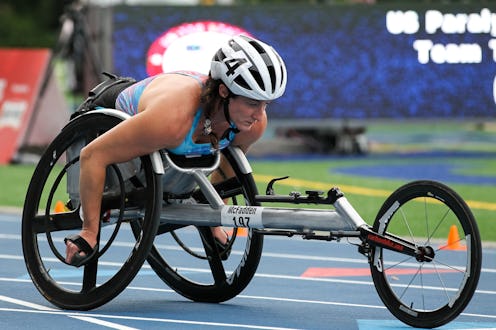(Fitness)
The Workout All 30-Somethings Should Be Doing, According To A Paralympic Medalist
No, it’s not cardio.

Having Olympics withdrawals? Well, you’ll be happy to know the 2020 Games are far from over. August 24 marks the start of the Paralympic Games in Tokyo, with all the inspiring moments and excitement ready for your consumption. Arguably, one of the most awe-inducing aspects of global competitions like this is the sheer endurance, strength, and stamina of the athletes involved — it’s truly other-worldly. Or is it more a matter of dedication and dynamite Olympic training? In observing and speaking to track racing champion Tatyana McFadden, it seems the answer is all of the above.
In a sit-down with TZR the 17-time Paralympic medalist (whose participation in Tokyo marks her sixth Games) explains how she trains for a major event like this, and it’s rigorous to say the very least. “I do about 100 to 120 [track] miles a week depending on training load,” says the McFadden. “In the gym, I’ll do bench presses, lots of dumbbell work, rope climbs, and pull-ups. For wheelchair racers, everything is upper body. We have to keep our shoulders and wrists in good shape.”
The 32-year-old adds that, strength training and weight-lifting becomes even more crucial as you enter your 30s and beyond. “As women get older, lifting is really important, using weights or resistance,” she explains. “Doing kettle ball exercises, benchwork with dumbbells, or band work [is important] because you lose muscle mass as you get older.” (In fact, according to a 2016 study by Harvard Medical School, people “begin to lose as much as 3% to 5% of muscle mass per decade,” after the age of 30.)
But all that focus on the upper body can also take its toll, which is why McFadden explains a crucial component to her workouts is diet and recovery. “I spend a lot of time with the Theragun, working on my shoulders,” she says. “I use a roller as well to roll out muscle groups I’m using in my back and arms. I also follow a specific meal plan that includes appropriate carbs for before training and for proper healing after [to aid in] recovery.”
This strict training diet can be “pretty bland” and often excludes fruit (“too much acidity”) and whole grains two hours prior to a training session or competition. That said, McFadden says she’s found ways to spice up her pre-Paralympics eating plan. “It’s been fun making interesting meals and experimenting with that this summer,” she says. “I’m learning how to use an air-fryer. I also like to make cod. I’ll throw cumin, cayenne pepper, and lime on it, and let that boil in the pan, then make a sauce using Greek yogurt with lime juice. I’ll make fun salads too with quinoa and veggies.”
And as taxing as prep for a major event can be on one’s body and mind, McFadden explains she’s just happy to compete again. The past year in lockdown limited her access to track meets, something she dearly missed. “I moved to Florida in January of last year [2020] to train outdoors for Tokyo and got an apartment I thought I’d only stay in until May, and then the pandemic hit,” she explains. “I ended up staying a full year, but I learned a lot about myself. I didn’t know anyone in Florida and obviously there was no socializing. I’m a very social person and that was the hardest part — I had to learn to be OK with being alone.”
McFadden found comfort in outdoor training, which “saved me mentally,” and got involved in a passion project or two to keep busy. “I was trying to figure out other creative ways to stay in the social limelight,” she explains. “I helped produce the film Rising Phoenix on Netflix, about the history of the Paralympics and how it originated. A lot of people don’t know how it came about. I was really fortunate to have that project. It was such a great experience.”
The film also got her even more hyped and inspired for this year’s Games, which she says will be a very unique year, especially considering last year’s cancelation and the past 18 months of social distancing. “I’m just excited to compete again,” she says. “I took it for granted before. I’ll be happy to see my competitors. I’m going to hug the track!”
To learn more about Team USA, visit TeamUSA.org. The Tokyo Paralympics begin August 24th on NBC.
This article was originally published on